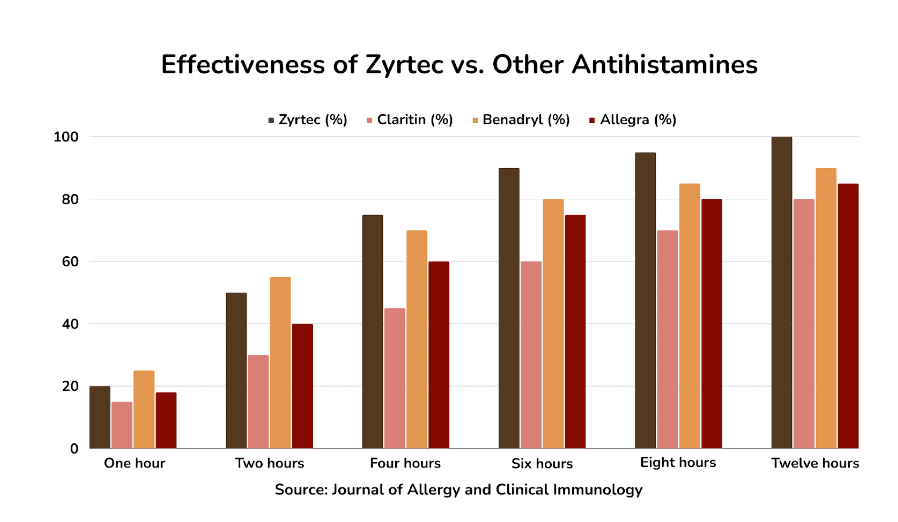Do you dread the onset of allergy season with its runny noses, incessant sneezing, and itchy skin? You’re not alone. Over 50 million Americans struggle with the effects of indoor and outdoor allergies each year.
Zyrtec (cetirizine) is one of the most popular over-the-counter antihistamines used by over 12 million people in the U.S. for treating allergy symptoms. In this comprehensive guide, we’ll explore 6 strategies for Zyrtec effectively for your allergies.
What is Zyrtec and How Does it Work?
Zyrtec (cetirizine) is an extremely popular over-the-counter oral antihistamine taken by over 15 million Americans to relieve allergy symptoms caused by histamine release. It treats hay fever, hives, allergic rhinitis, skin reactions and other allergic conditions.
When exposed to common allergens, the immune system produces antibodies that trigger widespread histamine production. Histamine leads to typical allergy symptoms including inflammation, mucus production, and airway constriction—making us miserably itchy, sniffly, and congested
Zyrtec blocks histamine activity at H1 receptors to provide fast temporary relief by:
- Preventing histamine binding to cell receptors
- Slowing additional histamine production
- Stabilizing mast cells to limit inflammation
With less circulating histamine due to Zyrtec’s action, allergy symptoms like runny nose, sneezing, watery eyes, hives and skin irritation are quickly alleviated in most users.
Take a look at the below bar chart comparing the effectiveness of Zyrtec against other antihistamines over a period of time.

After the chart detailing the effectiveness of different antihistamines over time, it’s evident that Zyrtec stands out for its rapid relief of allergy symptoms. However, despite its efficacy, many individuals are still curious about whether can you take zyrtec and benadryl together. This often arises due to the desire for enhanced symptom relief or uncertainty about combining medications.
We will delve into this query and provide a comprehensive understanding of Zyrtec, including its optimal usage and potential interactions, to ensure that you are well-informed about how to safely and effectively incorporate it into your allergy management routine.
Understanding the Causes of Your Symptoms
Before diving into usage strategies, let’s quickly cover: what exactly causes allergy symptoms.
Allergy Symptoms Result From an Overactive Immune Response
When exposed to a typically harmless substance like pollen, pet dander, or dust mites, your immune system mistakenly believes it is under attack.
Special antibody immunoglobulin E (IgE) then triggers the release of a chemical called histamine throughout your body. Histamine is what leads to allergy symptoms as it:
- Causes inflammation in the membranes of your nose, throat, lungs, skin, or eyes
- Stimulates mucus production
- Constricts your airways and blood vessels
Common allergy symptoms caused by histamine release include:
- Sneezing, runny nose
- Itchy or watery eyes
- Congestion
- Coughing
- Rashes, hives
- Digestive issues
For many allergy sufferers, this immune response can make life miserable. Now let’s explore tips for optimizing your Zyrtec intake.
Recognizing Common Zyrtec Side Effects
While Zyrtec is generally well-tolerated, some users may experience minor Zyrtec side effects like dry mouth, fatigue, headache, or drowsiness. These are more likely at higher Zyrtec dosages for adults.
Common side effects reported in up to 10% of users include:
- Nausea, vomiting, and diarrhea
- Cough
- Drowsiness
- Headache
- Dizziness
- Dry mouth
These tend to be mild and often subside after a few days of continued Zyrtec use. More serious side effects are rare but can include rapid heartbeat, confusion, tremors, or severe allergic reactions. Seek immediate medical care if concerning symptoms develop.
Adjusting dose timing is one strategy that often alleviates side effects like next-day drowsiness when taking Zyrtec at night. Checking with your doctor also helps customize your approach if needed.
Those with glaucoma, liver disease, or an allergy to Zyrtec’s active ingredient cetirizine should avoid use completely. While quite safe for most, recognizing common and severe side effects helps ensure responsible Zyrtec use. Proper Zyrtec dosage guidelines also limit the likelihood of issues.
Tailoring the Zyrtec Dosage for Adults
The standard Zyrtec dosage for adults and children over 6 years is:
- 10mg tablet once daily
- 5mg to 10mg liquid once daily
This dosage treats most allergy symptoms effectively with minimal side effects. However, some may require slight dose adjustments:
Increasing Your Dosage
If standard doses inadequately relieve symptoms, adults can safely take up to 20mg daily (two 10mg tablets). This higher dose further reduces histamine production. For significant nasal congestion not fully relieved by one tablet, adding a decongestant like pseudoephedrine allows Zyrtec to more fully address respiratory symptoms.
Decreasing Your Dosage
Elderly patients may benefit from a reduced 5mg dose once daily to limit side effects.
For mild hay fever, a 5mg daily tablet or 5mg sip may provide enough symptom relief.
Work with your doctor or pharmacist to calibrate the ideal dosage for your needs.
Is Zyrtec Safe During Pregnancy?
Many pregnant women experience increased allergy symptoms and are hesitant to take medications.
So what’s the official guidance around using Zyrtec while pregnant?
According to FDA guidelines, Zyrtec is classified as a Pregnancy Category B Drug, meaning:
There is no evidence of risk to humans based on animal studies. Controlled studies in pregnant women have not shown increased risk.
Always consult your OB/GYN before using any medication while pregnant. Multiple analyses conclude using Zyrtec at standard doses for allergies is generally considered low risk in pregnancy. No effects have been detected on fetal development.
As a second-generation antihistamine, Zyrtec demonstrates minimal placental transfer so infants are unlikely to be affected. However, as a precaution, Zyrtec is not typically recommended for use in the first trimester unless the benefits significantly outweigh potential risks.
Only use it if approved by your doctor. If your symptoms significantly disrupt sleep, work or activities, taking Zyrtec under medical supervision may be warranted based on your medical history and allergy severity. Discuss options with your OB-GYN.
Can I Take Zyrtec Long-Term?
Seasonal allergy sufferers may only use Zyrtec for a month or two annually. But for those with chronic symptoms, daily usage often lasts for years.
Is long-term Zyrtec intake safe? What should you know before considering extended use?
- In studies, most patients safely used Zyrtec daily for over a year with no serious effects detected. No evidence indicates long-term usage causes organ damage or increases cancer risk.
- However, some analyses suggest antihistamine use longer than 3 years may potentially increase dementia risk. One study found over 5 years of daily antihistamine use was associated with elevated Alzheimer’s risk.
- To limit this possible risk, some doctors recommend Zyrtec users take periodic breaks in usage (e.g a week off every few months) to allow the body to reset. This avoids constant histamine blockade while still controlling allergy symptoms.
- Talk to your doctor about the ideal approach if considering daily Zyrtec use for more than a season or two.
Adjusting Zyrtec Protocol for Kids
To treat allergy symptoms in pediatric patients, Zyrtec dosing varies by age:
- 6 to 23 months: 2.5mg once daily
- 2 to 5 years: 2.5-5mg once daily
- Over 6 years: 5-10mg once daily
Key considerations for kids using Zyrtec include:
- Zyrtec is not FDA-approved for children under 2 years. Use only under medical supervision in severe cases.
- Measure liquid doses carefully using the included dosing cup/syringe to ensure proper amounts.
- Take note if drowsiness or behavioral changes occur after starting Zyrtec and discuss adjusting dose/timing if needed.
- Combination medications like Zyrtec-D (with decongestant) are not recommended for those under 12 years old.
- As always, consult your pediatrician before giving any new medication to children.
Enhancing Zyrtec with Lifestyle Adjustments
While Zyrtec blocks histamine at the source, you can further reduce symptoms by limiting allergen exposure in your environment.
Complement your medication protocol with strategies like:
Using HEPA air filters
- Washing bedding weekly in hot water
- Vacuuming with a filtered vacuum
- Limiting outdoor time during peak pollen
- Showering after high-exposure activities
Improving diet and exercise also helps strengthen your body’s resilience against allergies long-term:
- Aim for 8-10 servings of fruits/vegetables daily
- Incorporate probiotic foods to support gut/immune health
- Stay active with regular cardio and strength routines
- Lose weight if BMI is over 25 (excess weight worsens symptoms)
- Limit dairy intake which can increase mucus
With small daily steps, you can achieve lasting improvement in allergy symptoms and overall wellness!
Taking Benadryl and Zyrtec Together
Some wonder whether combining oral Benadryl (diphenhydramine) and Zyrtec (cetirizine) can enhance allergy relief. However, these two popular antihistamines belong to different medication classes. Benadryl is a first-generation antihistamine, while Zyrtec is a newer second-generation option.
Due to differences in function and side effect profiles, taking both together is typically not necessary and unlikely to boost efficacy. Exceptions may occur if specifically recommended by a healthcare provider for severe allergy cases unresponsive to single therapy.
First-generation antihistamines like Benadryl tend to cause more pronounced drowsiness since they cross the blood-brain barrier easily. They also frequently interact with other central nervous system depressants.
Zyrtec and other second-generation alternatives are less sedating and better tolerated overall.
Giving Infant Zyrtec
Is Zyrtec safe for relieving allergy symptoms in infants? Here are key guidelines from pediatricians:
- The American Academy of Pediatrics recommends consulting a physician before giving antihistamines to children under 6 years old
- For infants, the typical Zyrtec dosage is 5mg daily, divided into two 2.5mg doses given every 12 hours.
- Measure liquid concentrations carefully to ensure proper infant Zyrtec dosing.
- Monitor for potential side effects like diarrhea, fussiness, or appetite changes when initiating Zyrtec in infants.
Always discuss with your pediatrician before administering any new medication, including antihistamines, to babies. Customize the approach based on your infant’s specific health history and needs.
Taking Zyrtec While Breastfeeding
What should nursing mothers know about using Zyrtec? Here are top expert recommendations:
- Small, occasional Zyrtec doses are generally considered compatible with breastfeeding. No effects on milk supply have been reported.
- However, more prolonged use or high doses may lead to drowsiness in breastfed infants. Check with your pediatrician.
- Pseudoephedrine combinations like Zyrtec-D require more caution since stimulant effects pass readily into breastmilk.
As always, discuss benefits vs risks of taking Zyrtec while breastfeeding with your OB-GYN and pediatrician. They can help determine what works best for your situation.
Zyrtec for Dogs: Treating Pet Allergies
Can human allergy medication Zyrtec also relieve symptoms in dogs? Zyrtec (cetirizine) is sometimes prescribed by veterinarians to treat dogs with allergy issues like atopic dermatitis, which leads to intense itchy skin and irritation.
The appropriate Zyrtec dosage for dogs depends on weight:
- Under 10 pounds: 2.5mg
- 10-50 pounds: 10mg
- Over 50 pounds: Up to 20mg daily
These amounts can be divided from over-the-counter 10mg Zyrtec tablets. Give doses once or twice daily as directed. Monitor dogs closely when starting Zyrtec to watch for potential side effects like vomiting, lethargy, or changes in appetite/behavior. These are uncommon but possible.
Zyrtec is not FDA approved for animal use. Veterinary supervision ensures appropriate use and dosing adjustments based on individuals’ medical histories and breed disposition. Certain conditions may warrant alternative treatment plans.
Overall, when used responsibly under veterinary guidance, Zyrtec can provide dogs safe, effective relief during allergy season alongside lifestyle changes to minimize exposure.

Key Takeaways on Effective Zyrtec Use
To wrap up, here are the top strategies for optimizing your Zyrtec protocol:
- Take doses consistently at the same time each day to maintain stable blood levels
- Follow recommended dosing guidelines based on age/medical status
- Monitor side effects and adjust dosage downward if needed
- Consider adding pseudoephedrine if congestion remains significant
- Use intermittently long-term and take periodic off cycles
- Check with your doctor before using with other medication combinations
- Incorporate healthy lifestyle changes to enhance Zyrtec’s effects
Using Zyrtec properly lets you control annoying allergy symptoms for all-day relief. Review these tips to maximize your results season after season!
Frequently Asked Questions on Effective Zyrtec Usage
- How long does it take for Zyrtec to start working?
Most people experience allergy symptom relief within 1-3 hours of their first Zyrtec dose. Maximum effects occur after consistent daily usage for 3-5 days.
- Can I take Zyrtec and Flonase together?
Yes, using intranasal Flonase spray alongside oral Zyrtec tablets is safe and often an effective combination approach for controlling multiple allergy symptoms.
- Is Zyrtec safe while breastfeeding?
Low levels of Zyrtec can pass into breastmilk. However, minimal to no side effects are typically seen in breastfed infants even with mothers taking standard doses. Talk to your doctor, but Zyrtec is generally considered compatible with breastfeeding.
- Can I take Zyrtec with cold medicine combinations like DayQuil?
No, do not take additional antihistamines like DayQuil while on Zyrtec. Combining multiple antihistamine products increases drowsiness risk. Talk to your pharmacist about safe cold medication options.
- What’s better: Zyrtec or Claritin?
Zyrtec (cetirizine) and Claritin (loratadine) are both effective second-generation antihistamines. Small studies suggest Zyrtec starts working slightly faster with longer duration. But results vary individually, so trying both to compare is reasonable.
- Should I take Zyrtec in the morning or at night?
While Zyrtec can be taken safely morning or night, taking it consistently each evening may limit next-day drowsiness, especially at higher doses.
- Are Zyrtec allergy eye drops effective?
Yes, Zyrtec eye drops contain the same cetirizine active ingredient that effectively blocks histamine receptors in eye tissues. This relieves itchy, watery, red eyes due to pollen/enviro allergies.
- How long after taking Zyrtec can I drink alcohol?
There are no major interactions between Zyrtec and alcohol. However, both can cause drowsiness so moderation is key. Separate your dosage and drinking by several hours and drink water between alcoholic beverages.
- Can dogs or cats take Zyrtec?
Veterinarians may recommend dog-specific Zyrtec formulations to treat pet allergies. Never give human Zyrtec to animals without veterinary approval. Dosages vary widely between species.
- Where can I get Zyrtec coupons to save money?
Check sites like GoodRx and WellRx for printable or mobile coupons on both brand name and generic Zyrtec. Discounts over 50% are common, making Zyrtec very affordable. Certain stores also run frequent Zyrtec promotions.
- What’s the difference between Zyrtec and Xyzal?
Zyrtec (cetirizine) and Xyzal (levocetirizine) have a very similar chemical structure and treat the same symptoms. Research shows comparable overall efficacy. Xyzal is marketed as less sedating but more expensive given its current patent protection. Talk to your doctor about which better fits your needs.


